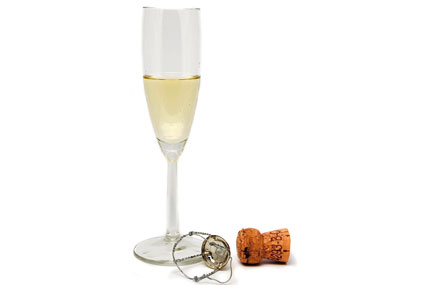As a product that is emblematic of excess, it is perhaps not so surprising that sales of Champagne have been in decline. After all, there has been precious little cheer to start the corks popping, particularly in the Champagne and wine bars of the City, favoured by those whose excesses we can thank for the country's financial troubles.
Nonetheless, the extent to which the sales of the wine that comes exclusively from the Champagne region of northern France have dropped is still startling. The Federation of French Wine and Spirits Exporters reported that last year, sales suffered their biggest annual decline on record.
The organisation that represents producers said exports of Champagne fell by almost a third and that the UK, Italy and Spain were particularly badly hit as consumers turned to cheaper New World brands.
For a product that has built its exclusivity and desirability on an ancient association with the anointment of French kings, and invoked European legislation to protect its treasured status, being usurped from its place in ice buckets by sparkling Shiraz from Australia or Cap Classique from South Africa must be particularly irksome.
So what can Champagne producers do to hasten the opening of a bottle in celebration of a revival? We asked Geri Richards, chief executive of Publicis Blueprint, who has worked on food and drink titles for Tesco and Asda, and Charles Faircloth, managing director of Euro RSCG Luxe, which works with brands including Piper Heidsieck.
Geri Richards, chief executive, Publicis Blueprint
"Premier League footballers and bankers who get bonuses may still be knocking back £200-plus bottles of Cristal, but credit-crunched Joe Public has had the Veuve Clicquot knocked right out of him.
Cash-strapped Rosbifs don't want to pay overinflated prices for top brands and have been disappointed when they have traded down to sub-standard cheaper bottles. These have diluted Champagne's quality image. People are no longer beguiled by the real thing just because it's made to traditional methods in a small designated area. There is no longer any stigma attached to celebrating with cheaper alternatives, Asti Spumante aside. Our practiced palates have grown partial to Prosecco, accustomed to Cava and are happy sipping sparklers from Down Under.
Supermarkets and off-licences are happy to feed this promiscuity with good-value fizz that we can afford even if we're not celebrating. Shelves are groaning with non-French bruts in all colours, and we get change from a tenner. French Champagne producers need to reassert their premium status, and make us feel it's worth splashing out again."
Remedy
- Reassociate Champagne with its glamorous heritage through emotive advertising: think chateaux and chic 20s.
- Make more of the region. Bordeaux Wines is doing a great job getting producers together in a generic marketing campaign. Its recent supplement in The Observer is a good example of communicating quality.
- PR Champagne award winners, underline the standards and values associated only with Champagne.
- Get Champagne back on the agenda by linking up with Michelin restaurants in brand partnerships.
Charles Faircloth, managing director, Euro RSCG Luxe
"The downturn in the economy has not meant that people have stopped spending money or given up drinking alcohol, but rather that they are scrutinising more carefully what they spend their hard-earned cash on and reining in purchases they cannot justify.
A drop in sales doesn't mean that no one is drinking Champagne. For high net-worth individuals, Champagne will still be a viable option but for many with lower disposable incomes, Champagne just simply won't make the cut. The likelihood is that this has meant defaulting to Cava or Prosecco as a lower-cost, acceptable alternative.
Added to this, there is almost a social stigma attached to Champagne. It is an obvious and immediate shorthand for decadent living and some may feel that its doesn't send the right signals to friends or peers in this climate, again making cheaper alternatives preferable. It enables people to enjoy the experience without the prohibitive cost."
Remedy
- Look at strategies that have succeeded in these tougher times - mining the Grey Goose vodka success story with its premium positioning would be a great place to start.
- Play to the strengths of exclusivity. Champagne, in particular, had become a little too mainstream for its own good, so dropping production across the region may not necessarily be an altogether bad thing in the long run.
- Operate more like a Giffen good, and drive the margins back into the business.
- Go hard on communicating the rationale of the unique and exclusive nature of Champagne to make consumers appreciate its high-end pricing and justify it in their minds.


